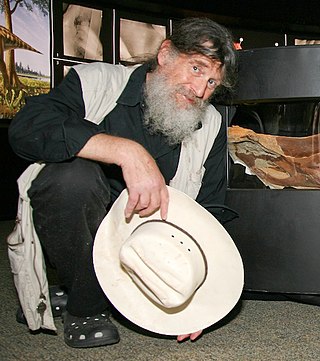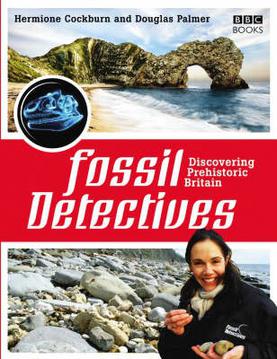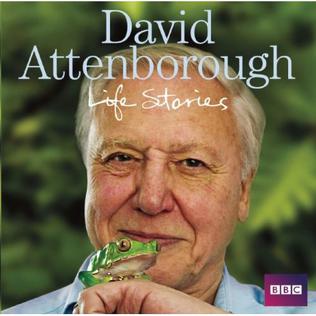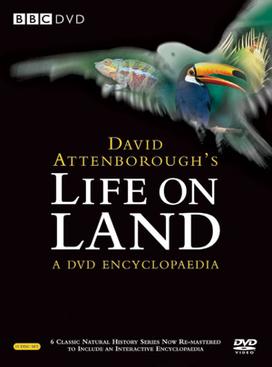
Sir David Frederick Attenborough is a British broadcaster, biologist, natural historian, and writer. He is best known for writing and presenting, in conjunction with the BBC Natural History Unit, the nine natural history documentary series forming the Life collection, a comprehensive survey of animal and plant life on Earth.

The Life of Mammals is a nature documentary series written and presented by David Attenborough, first transmitted in the United Kingdom from 20 November 2002.

Robert Thomas Bakker is an American paleontologist who helped reshape modern theories about dinosaurs, particularly by adding support to the theory that some dinosaurs were endothermic (warm-blooded). Along with his mentor John Ostrom, Bakker was responsible for initiating the ongoing "dinosaur renaissance" in paleontological studies, beginning with Bakker's article "Dinosaur Renaissance" in the April 1975 issue of Scientific American. His specialty is the ecological context and behavior of dinosaurs.

Richard Alan Fortey is a British palaeontologist, natural historian, writer and television presenter, who served as president of the Geological Society of London for its bicentennial year of 2007.

Natural World is a strand of British wildlife documentary programmes broadcast on BBC Two and BBC Two HD and regarded by the BBC as its flagship natural history series. It is the longest-running documentary in its genre on British television, with nearly 500 episodes broadcast since its inception in 1983. Natural World programmes are typically one-off films that take an in-depth look at particular natural history events, stories or subjects from around the globe.

Neil Nightingale is a British freelance wildlife filmmaker, executive producer and creative consultant with over 35 years experience at the BBC. From 2009 to 2018 he was the creative director of BBC Earth, BBC Worldwide's global brand for all BBC nature and science content.

Are We Changing Planet Earth? and Can We Save Planet Earth? are two programmes that form a documentary about global warming, presented by David Attenborough. They were first broadcast in the United Kingdom on 24 May and 1 June 2006 respectively.
John Michael Salisbury, is an English documentary filmmaker specialising in natural history programmes for television. In a career spanning four decades, he spent over 30 years working for the BBC Natural History Unit where he produced a string of award-winning series, many in collaboration with David Attenborough. He retired from the Unit in 2006 but continues to work as a freelance producer. In 2007, he was made an OBE in the New Year Honours List for his services to broadcasting.

The First Eden: The Mediterranean World and Man is a BBC documentary series written and presented by David Attenborough, first transmitted in the United Kingdom from 8 March 1987.

The Living Planet: A Portrait of the Earth is a BBC nature documentary series written and presented by David Attenborough, first transmitted in the UK from 19 January 1984.

Fossil Detectives is a 2008 BBC Television documentary series in which presenter Hermione Cockburn travels across Great Britain exploring fossil sites and discovering the latest scientific developments in geology and palaeontology. The show is a spin-off of Coast.
The following is a chronological list of television series and individual programmes in which Sir David Attenborough is credited as a writer, presenter, narrator, producer, interviewee, etc. In a career spanning eight decades, Attenborough's name has become synonymous with the natural history programmes produced by the BBC Natural History Unit.

David Attenborough's Life Stories is a series of monologues written and spoken by British broadcaster David Attenborough on the subject of natural history. They were broadcast on BBC Radio 4 in 2009 as part of the station's "Point of View" strand, in the weekly timeslot formerly occupied by Alistair Cooke's Letter from America. In each of the 20 programmes, Attenborough discusses a particular subject of personal resonance, drawing on his experience of six decades filming the natural world. The series was produced by Julian Hector, head of radio at the BBC Natural History Unit.
First Life is a 2010 British nature documentary series written and presented by David Attenborough, also known by the expanded titles David Attenborough's First Life (UK) and First Life with David Attenborough (USA). It was first broadcast in the US as a two-hour special on the Discovery Channel on 24 October 2010. In the United Kingdom it was broadcast as a two-part series on BBC Two on 5 November 2010. First Life sees Attenborough tackle the subject of the origin of life on Earth. He investigates the evidence from the earliest fossils, which suggest that complex animals first appeared in the oceans around 540 million years ago, an event known as the Cambrian Explosion. Trace fossils of multicellular organisms from an even earlier period, the Ediacaran biota, are also examined. Attenborough travels to Canada, Morocco and Australia, using some of the latest fossil discoveries and their nearest equivalents amongst living species to reveal what life may have been like at that time. Visual effects and computer animation are used to reconstruct and animate the extinct life forms. Attenborough's Journey, a documentary film profiling the presenter as he journeyed around the globe filming First Life, was shown on BBC Two on 24 October 2010. A hardback book to accompany the series, authored by Matt Kaplan with a foreword by Attenborough, was published in September 2010.

David Attenborough's Life on Land: A DVD Encyclopaedia is a DVD box set of nature documentaries made by the BBC Natural History Unit. It comprises six series spread across 15 discs, all of them written and presented by David Attenborough, and together forming a comprehensive introduction to the major groups of terrestrial lifeforms. The series were filmed between 1987 and 2008, but are presented in the order in which the groups evolved, beginning with invertebrates and culminating with human beings, to tell the continuous story of the development of life on land. With a total running time exceeding 34 hours, it represents an in-depth visual survey of the living world as it exists today, at the beginning of the 21st century.
Keith Scholey is a British producer of nature documentaries for television and cinema, and a former television executive. He is currently a joint Director of Silverback Films Ltd and Studio Silverback Ltd.
Attenborough: 60 Years in the Wild is a three-part BBC documentary series chronicling the 60 years career making wildlife programmes of Sir David Attenborough. The first hour-long programme, titled "Life on Camera" was broadcast on Friday 16 November 2012 on BBC Two at 9pm. The second part, "Understanding the Natural World" and third and final part, "Our Fragile Planet" were broadcast on following Fridays, 23 and 30 November 2012.
Triumph of the Vertebrates is a 2013 British documentary film by David Attenborough. It is about the evolution of vertebrates. The first part is From the Seas to the Skies, while the second is Dawn of the Mammals. The film uses a circular timetree of life generated by scientists S. Blair Hedges and Sudhir Kumar, from their TimeTree database, as a temporal framework for the production. The timetree was created using animated computer-generated imagery in scenes every 10 minutes during the 2-hour movie. The circular timetree was published by Hedges and Kumar in 2009 and Hedges was consulted during the production of the film.
William Grant Oliver Attenborough is an English actor. On television, he is known for his role in the BBC One series Our Girl (2020). His films include Dunkirk (2017) and The Outpost (2020).
Dinosaurs: The Final Day with David Attenborough is a British documentary programme that aired on BBC One on 15 April 2022. Presented by David Attenborough, the documentary follows the final days of non-avian dinosaurs through the Cretaceous–Paleogene extinction event, similar to Apple TV+’s Prehistoric Planet. Like that series, the programme's creatures were also made with computer-generated imagery.












